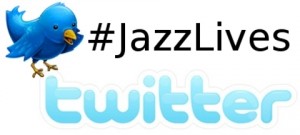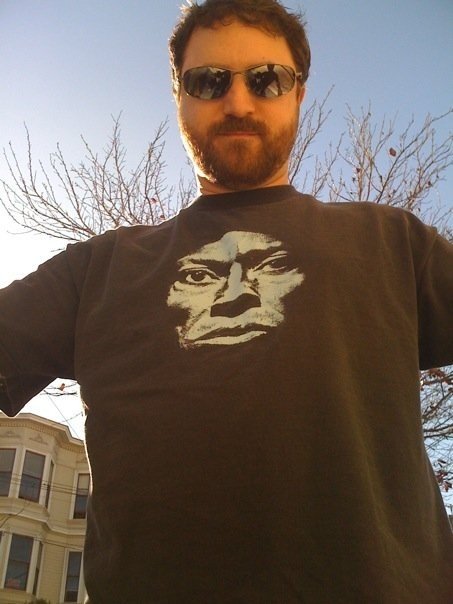 I joined Twitter shortly after starting this blog and since then I have met some really cool people. It’s helped me connect to many other working musicians that continue to inspire and entertain me. I thought I would use this post to introduce you to some of these people in the hopes that they will inspire and entertain you too.
I joined Twitter shortly after starting this blog and since then I have met some really cool people. It’s helped me connect to many other working musicians that continue to inspire and entertain me. I thought I would use this post to introduce you to some of these people in the hopes that they will inspire and entertain you too.
Twitter has it’s own version of this, called #followfriday, where users suggest their favorite friends to follow. This is my blogcentric way of doing the same thing.
This is by no means an exhaustive list – in fact, this is probably the first in an ongoing, if irregular, series. Next time I’ll give you 10 more! But here is the first list. If you’re interested in jazz, music, and how musicians are making a go of it, you should follow all of these people.
1. @AtmosTrio is Rob Michael, a guitarist from the San Francisco area who leads the Atmos Trio. Not only does he tweet great information for musicians, but he has started to do weekly live video concerts from his studio! How cool is that?
2. @chrisdonnelly99 is Chris Donnelly, a young pianist from Toronto. He has a blog where he talks about many issues facing jazz today, often related to education (Chris is also a professor at University of Toronto). His posts are always engaging and thought-provoking.
3. @geoffreykeezer is Geoffrey Keezer, pianist extraordinaire. Geoffrey has played with a who’s who of jazz musicians, including Art Blakey, Diana Krall, Christian McBride, Ingrid Jensen, Chris Botti and many, many more. Geoffrey tweets from concerts with Botti, sends jokes, and even 12 second piano lessons.
4. @mattwilsonjazz is Matt Wilson, one of the most creative drummers around and also one of the funniest men you’ll ever meet. His tweets are equal parts philosophy and tomfoolery and will keep you on your toes. Plus, he does stuff like this.
5. @pianopeter is Peter Martin, pianist with the likes of Betty Carter, Wynton Marsalis, Dianne Reeves and Joshua Redman. Peter has been sending tweets containing video tour blogs and reports from his various concerts and tours. One recent day he kept us all updated while waiting 5 hours for his plane to take off!
6. @rgambarini is Roberta Gambarini, who renowned pianist Hank Jones calls “the best singer to emerge in over 60 years.” Roberta has been wowing crowds since she was a teenager and continues to do so by carrying on in the tradition of the great singers like Ella Fitzgerald and Carmen McRae. Follow her tweets as she travels the world with her own band, as well as legends like Roy Hargrove and James Moody.
7. @solobasssteve is Steve Lawson, solo bassist from the UK. Steve’s blog is an incredible resource for musicians, and we can all learn a thing or two about the meaning of success from the way he has structured his career. He has six self-produced albums, has great success with house concerts, and is truly livin’ the dream.
8. @SunnaGunnlaugs is Icelandic pianist Sunna Gunnlaugs. Her bio says she is “Bridging the Brooklyn-Reykjavik jazz divide with European elegance and a fiery, New York drive.” That statement beautifully sums up her music, much of which she gives away for free! Her blog and her tweets are fun and interesting. And did I mention the free music????
9. @uglyrug is Portland composer Andrew Durkin, leader of the Industrial Jazz Group. Andrew is doing what few dare to do – leading a big band. But not just any big band, but a band described as “avant-garde party music”: an idiosyncratic, charming / disarming blend of jazz, rock, cartoon soundtracks, humor, blues, funk, costumes, doo wop, dada, and a lot of other stuff. Plus, he tweets about his chickens.
10. @vijayiyer is Vijay Iyer, widely hailed as one of the the pre-eminent pianist of his generation. His new album Historicity is already getting votes for the best album of 2009, and his thoughts on the state of the music have made him one of the new spokespeople for jazz in the 21st century.
I hope you’ll follow these good folks and get as much out of your association with them as I do. One thing I can say about Twitter is that it is bringing the jazz community closer together than ever before, and that only benefits us all.
An aside: I just noticed that half the people on this list are piano players. What’s up with that?? 😉
Please feel free to add any of your favorite Tweeters in the comments.




Good list. I would also add @darcyjamesargue of Steampunk Big Band fame.
Very nice. Great job Jason and thanks for including me on your list. I’m flattered.
That’s some fine tweetin’ company to be in, Jason, thanks very much 🙂
What a great list! I feel honored to be included among such fin e company. Thanks Jason!!
I will listen to the works of the musicians that I’m not familiar with and see what I think. The way the music is approached now and the goal of the artist is way different from when I was making my way through the scene.
My question what are some of these artists going to do to help improve the dire straights that jazz is currently in. I just go by what my reference in time is.
I’ve worked with Geoff K before-Truly gifted musician
Thanks for commenting, guys! I’m happy to spread the love.
Jason, thanks for stopping by. I appreciate you comment. However, I think that “the way the music is approached now and the goal of the artist” is the same as it ever was, namely to make great music that is true to the heart and find ways to get it out to people who might like it. What’s changed is the tools we have at our disposal to do that last part. The onus is still on us to put out high-quality music, but there are now SO many ways to reach your potential audience, and Twitter is just one of those ways. I can say from personal experience that I would not have even a fraction of the reach that I do (however small that may be) without the tools that internet provides.
As for your question of what folks are doing to improve the jazz world, the answer lies in checking out their websites, following them, and seeing for yourself. I can tell you that with just these 10 folks, the profile of the “jazz musician” has been raised dramatically, from Rob’s Ustream concerts to Sunna’s free downloads to Geoff, Peter and Andrew’s tour blogs and on and on and on. I think if you spend some time investigating what these artists are all about you will get some idea of how the web is being used not only for self-promotion, but for promotion of jazz music as well. I would also encourage you to follow some of the links in my blogroll, on the left-hand side of this page. People are doing all sorts of cool stuff to help jazz find it’s audience!
Couldn’t agree more on this list. Durkin and Rob particularly. Really great stuff from all of these folks.
Why are so many people on your list piano players? Well, that’s very simple: They’re so used to keyboards that they can type faster and therefore have an advantage (à la Darwin’s “Survival of the Fittest”) in the Twitter world 😉
I think I follow most of these people already, primarily because of your #FF tweets. Thanks!
-Adam (@jazzman23)
I like some of Chris’ posts, unfortunately he doesn’t allow comments.
I studied jazz in college and was extremely frustrated at the time because they follow the typical – cram tons of stuff down your throat and see what happens approach, lots of extraneous material (classical history, non-core electives) instead of the ‘Imitate, assimilate, innovate’ method, which implies the first phase is just learning solos (listen-execute that chris mentions). Can you imagine spending the first year of school or more just learning songs/solos instead of trying to take a scale/mode and make music out of it with no context?
I see it time and time again, students struggling to make music even though they know the scales to use. The theory and experience needed to execute the 3rd phase, innovation comes way too early in the education process in my opinion.
Also many people don’t realize that to play at high speeds requires that brain /muscles develop memory. If you tell someone here are all the modes to use over this progression, there is no way that is going to turn into music at first.
Unfortunately when I complained the implications were that the student is the one with the problem.
Thanks for the comment Will. I believe you can leave comments on Chris’s blog…scroll all the way down to the bottom of the page and you’ll find a “leave a comment” link.
As for contextual learning…I couldn’t agree more! I’m all for studying theory, but it has to be put in the context of actually playing. And you’re right, transcribing is a great way to do that. This way we get to see how our favorite players apply the theory.
And I’ve always loved that Clark Terry quote…
you’re right, my bad!
i can’t tell you how frustrating it was in jazz college and I quit after 1.5 years. I have a master’s in engineering so I’m not exactly afraid of hard work. everybody trying to play and sounding like crap, with intimidating and often arrogant teachers (great musicians though). Giving us tunes like confirmation the first year and being lost trying to improvise over it.
Then I found Jimmy Bruno’s guitar institute and it became a simpler system of learning tunes and applying 5 caged shapes to the fretboard. the only missing link ( a big one in my opinion) is playing solos note for note and learning the language. Students that submitted videos would tend to ramble over scales and not really be melodic or reflect the language. He did teach chord tones, arpeggios, etc.
Then I found Greg Fishman’s jazz guitar/sax etudes. This allowed me to play at blistering speeds in really musical ways. You feel like you’re playing jazz whose power at early stages can’t be understimated. Of course you can also transcribe.
But then the challenge became how to take those skills (from the etudes) and truly improvise. Based on how I learned rock/blues it most likely becomes inherent after enough imitation and assimilation.
I’d love to somehow get this type of approach into the schools although they usually have strict policies to follow (electives, etc).
{ 1 trackback }